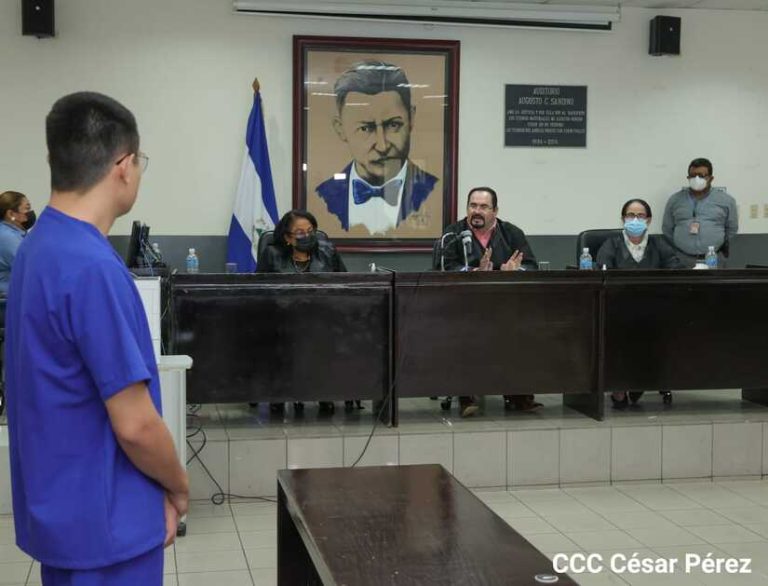2 de septiembre 2022

Children of Exile: The Births “Sowing Hope” in the Camp of Nicaraguan Farmers

PUBLICIDAD 1M
PUBLICIDAD 4D
PUBLICIDAD 5D
The Criminal Procedural Code does not contemplate “informative hearings”. Judge Octavio Rothschuh no longer has jurisdiction in these cases

The “informative hearings” were conducted by Judge Octavio Ernesto Rotschuh, president of Chamber One of the TAM. Photo: taken from El 19 Digital
The Ortega justice system invented the legal term of “informative hearing” to exhibit ten political prisoners this Tuesday, a day after relatives of the prisoners of conscience denounced that they were suffering from malnutrition and extreme weight loss. Lawyers and human rights defenders warned that Nicaragua's Criminal Procedural Code (CPP) does not establish the holding of “informative hearings” in any of its articles, and therefore their convocation and realization are “illegal” and pursue “political” ends.
Political prisoners Walter Gómez, Marcos Fletes, Pedro Vásquez, Miguel Mora, Juan Sebastián Chamorro, Medardo Mairena, Max Jerez, Lesther Alemán, José Antonio Pereza and Michael Healy were taken to these “hearings”. The opponents, detained between May and November 2021, were sentenced to between seven and thirteen years in prison for the alleged crimes of “conspiracy” or “money laundering”.
It is a “strategy of repression”, which shows “cruel and degrading treatment” against prisoners of conscience, and also seeks to “discredit” the denunciation of their relatives, who have warned of the risk to their lives in prison, incommunicado, without access to timely medical care and sufficient food, considered Vilma Nuñez, president of the Nicaraguan Center for Human Rights (Cenidh).
She detailed that the CPP only contemplates the following hearings: preliminary, initial, special, preparatory trial, trial, reading of the sentence, and protection of constitutional guarantees, but not the “informative hearing”, for which reason “all the actions of the regime are illegal” and represent a “continuation of the judicial farce that the trials have been”.
Last July 2, the Ortega regime also presented photographs of the political prisoner and former presidential aspirant, Felix Maradiaga, when he was taken to the Managua courts for a supposed hearing of ratification of sentence by the TAM, a day after his wife Berta Valle demanded to be allowed to see him after 389 days of jail and solitary confinement.
“Judges cannot invent procedural activities. They only have the power to carry out the procedural acts indicated in the Code. What these judges are individually involved in is the commission of crimes, which violate the guarantees of due process to the detriment of the defendants and make them criminals in their functions, who commit crimes against the administration of justice,” Nuñez stressed.
“They can commit the crime of contempt because they are acting against express law,” warned the human rights defender.
Defense attorney Henry Salatiel López agrees with Núñez that there is no legal basis to justify the improvised hearings and “they obey more to a political strategy of the Ortega regime” - to respond to the different campaigns demanding freedom for political prisoners and denouncing the lack of protection of their rights.
After more than a year of confinement and hermetic political trials, the pro-regime media presented photographs and videos of the ten political prisoners who were taken to the Managua courts for “informative hearings”, led by Magistrate Octavio Ernesto Rothschuh, president of Chamber One of the Managua Court of Appeals (TAM).
According to defense lawyers, the TAM is no longer competent to conduct hearings, since it has already ruled in most of the cases of political prisoners in El Chipote. Its function, at this moment, “is to verify that the appeals presented by the defense attorneys comply with the requirements of the law to be admitted and to elevate the case to the Supreme Court of Justice,” explained a defense attorney, who asked not to be named for security reasons.
The pro-government media indicated that Rothschuh informed the political prisoners about the status of the different judicial appeals presented by their lawyers. However, the magistrate did not summon the defense lawyers.
“It is illegal the summons because the lawyer was not there, it is illegal that hearing because it does not exist”, referred a defense lawyer.
CONFIDENCIAL consulted with several defense lawyers of political prisoners in El Chipote and they assured us that most of the appeals were admitted by the TAM and they are waiting for the response of the Public Prosecutor's Office. Once this step is completed, they must transfer the case to the Supreme Court of Justice, which will issue a resolution.
This is the last authority to which a Nicaraguan can turn for justice, prior to the international courts.
This article was originally published in Spanish in Confidencial and translated by our staff
Archivado como:
PUBLICIDAD 3M
Confidencial es un diario digital nicaragüense, de formato multimedia, fundado por Carlos F. Chamorro en junio de 1996. Inició como un semanario impreso y hoy es un medio de referencia regional con información, análisis, entrevistas, perfiles, reportajes e investigaciones sobre Nicaragua, informando desde el exilio por la persecución política de la dictadura de Daniel Ortega y Rosario Murillo.
PUBLICIDAD 3D